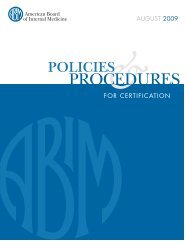The SRA Symposium - College of Medicine
The SRA Symposium - College of Medicine
The SRA Symposium - College of Medicine
You also want an ePaper? Increase the reach of your titles
YUMPU automatically turns print PDFs into web optimized ePapers that Google loves.
Papers<br />
Karl: During my time at the NMRC I realized that networking is a very important aspect <strong>of</strong> developing<br />
my career. Since broadening my pr<strong>of</strong>essional network was one <strong>of</strong> our objectives throughout<br />
my internship, I was provided with an opportunity to talk to many other scientists about the best<br />
ways <strong>of</strong> accomplishing my specific experiments. Moreover, many scientists advised me about<br />
medical schools as well. I also met many medical school students, who where simply doing their<br />
internships or working as regular employees in order to pay back the military for their education.<br />
<strong>The</strong>y gave me their perspectives as students, and advised me on ways to prepare for the MCAT.<br />
But more importantly, they became quick friends, whose influences may help me in my future<br />
career. A student’s networking must start with a good mentor effectively conveying the notion that<br />
pr<strong>of</strong>essional networks in science can be immensely helpful throughout a scientist’s career.<br />
Brent: A short summer internship, like Karl’s, does not present a great opportunity to set up a<br />
broad pr<strong>of</strong>essional network. But certainly Karl was able to meet with many people here at the<br />
NMRC and at the NNMC and build friendships that will hopefully serve him in the future. Karl<br />
will finish his internship understanding the importance <strong>of</strong> networking throughout his career.<br />
Teach Basic Skills. <strong>The</strong>re are several basic skills a scientist needs to acquire if he or she wishes to<br />
be successful. Unfortunately, many mentors take these for granted and do not sufficiently provide<br />
training for these basic skills:<br />
1) Many beginner scientists have little experience in planning, organizing tasks, and making<br />
good use <strong>of</strong> their time. <strong>The</strong> mentor can help them acquire this skill, possibly beginning<br />
with simple scheduling, where the mentoring appointments are used as a basic framework.<br />
2) Clear writing is essential to most careers. In science, writing is especially significant, as<br />
most scientists participate in writing research articles, review articles, grant proposal applications,<br />
article reviews, recommendation letters, etc. Very early on, the mentor should<br />
therefore engage students in writing tasks, provide meaningful feedback, and emphasize<br />
its importance.<br />
3) Public speaking is also a much-needed skill. Scientists have a huge advantage in their<br />
fields <strong>of</strong> study when they are able to present scientific ideas and results effectively to other<br />
scientists and engineers, as well as to the lay public and specialists in other fields. <strong>The</strong><br />
training required will vary greatly from trainee to trainee. Some may be naturally confident<br />
in front <strong>of</strong> groups, while others may display varying levels <strong>of</strong> anxiety towards giving<br />
public or class presentations. In extreme cases, trainees may benefit from pr<strong>of</strong>essional<br />
training, via speech classes or consultation.<br />
Karl: Dr. House not only taught me the basic laboratory techniques, but he also understood the<br />
importance <strong>of</strong> basic skills such as planning, writing and speaking. Before I came to the NMRC,<br />
Dr. House prepared a schedule with all the things I had to do during my internship. However, the<br />
schedule was open to change, therefore we were able to move things around and adjust them to<br />
be more convenient and useful. During my stay I had to write a scientific paper, which was a very<br />
new experience for me. I also prepared and gave a presentation about Malaria to the entire NMRC<br />
Malaria department.This was the first big public presentation that I have given. Practicing all these<br />
basic techniques at an early stage will contribute greatly to my future career.<br />
Brent: Before Karl arrived, I organized a calendar <strong>of</strong> projects that he would have while he was here.<br />
Karl wrote a research paper, created a poster and gave a PowerPoint (PP) presentation, learning<br />
some basics about writing and public speaking.<br />
40 2005 <strong>Symposium</strong> Proceedings Book

















